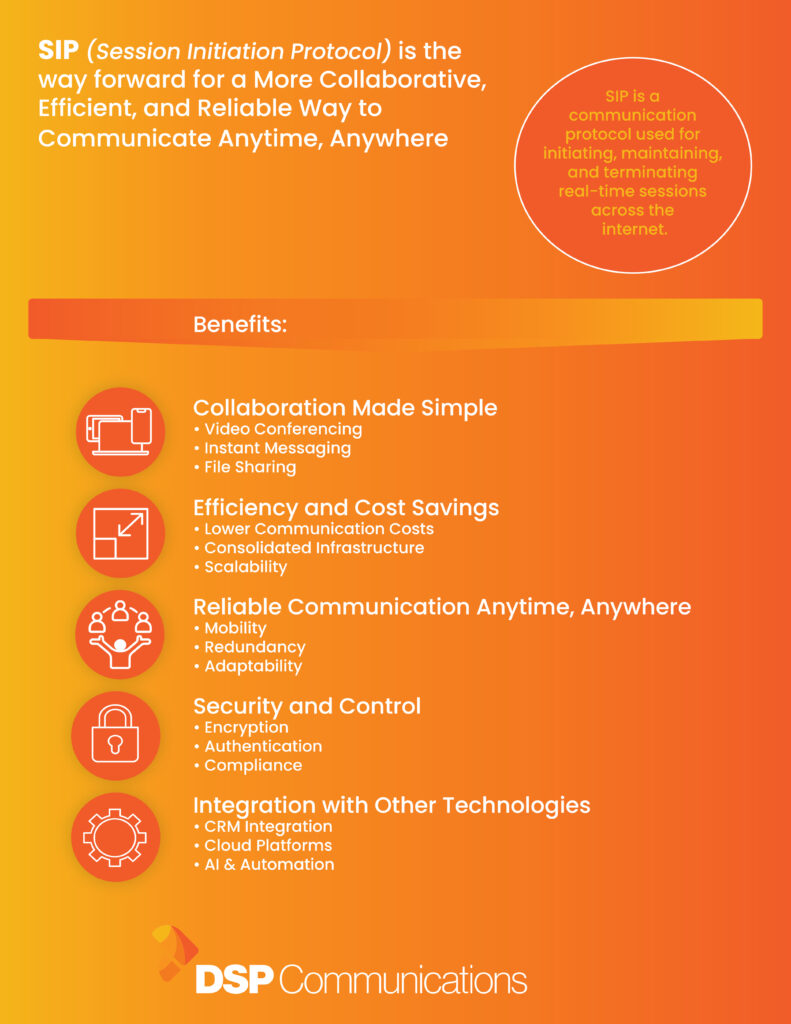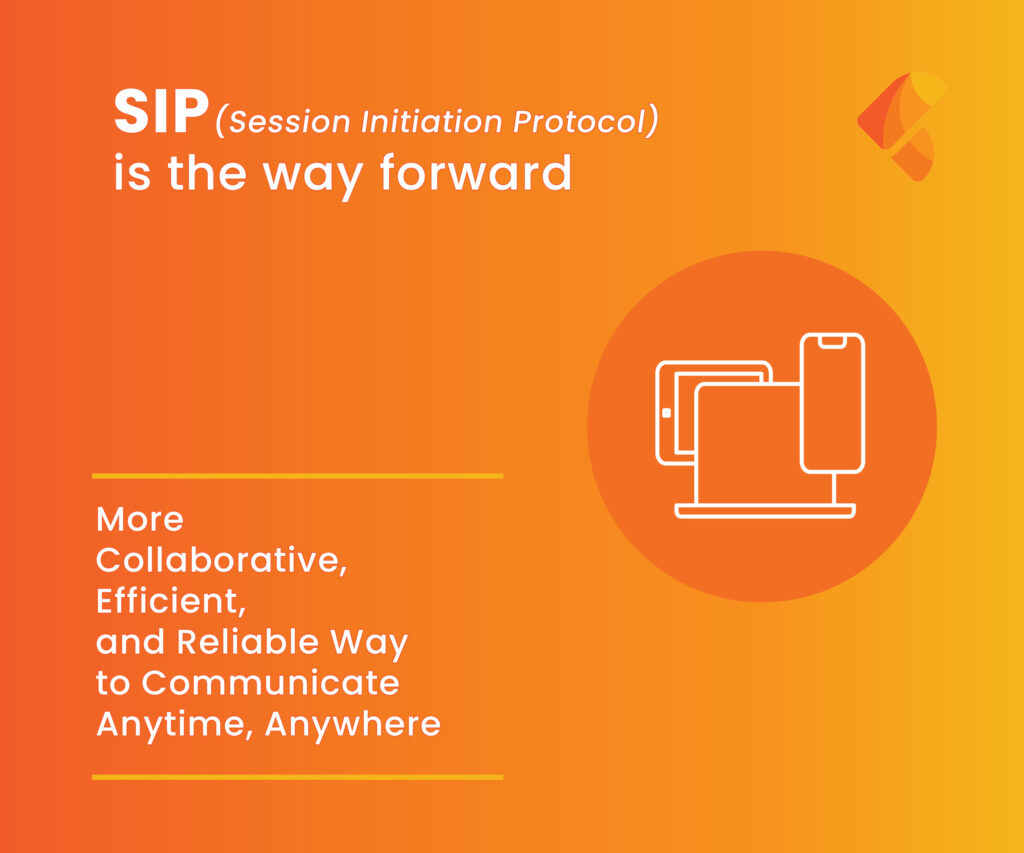What is SIP?
At its core, SIP is a communication protocol used for initiating, maintaining, and terminating real-time sessions across the internet. These sessions could include voice calls, video conferencing, messaging, and other forms of communication. SIP is the backbone of many modern communication technologies, including VoIP (Voice over Internet Protocol) systems, video conferencing platforms, and messaging services.
Unlike traditional phone systems, which rely on dedicated circuits, SIP utilises the internet to send information in data packets, allowing for a more flexible, scalable, and cost-effective communication system. In other words, SIP is the bridge that connects users across the globe, offering a unified platform to communicate seamlessly.
1. Collaboration Made Simple
In the modern workplace, collaboration is key. Whether you’re working remotely or in the office, collaboration tools need to be accessible, easy to use, and efficient. SIP excels in this area by supporting a wide variety of real-time communication channels—voice, video, and messaging—all in one unified platform.
- Video Conferencing: SIP-based platforms allow for high-quality video calls, helping teams across different geographical locations stay connected.
- Instant Messaging: Real-time text messaging via SIP can complement voice and video, facilitating easy information sharing and quick decision-making.
- File Sharing: SIP can integrate with other tools, enabling file sharing within communication sessions, making collaboration even more fluid.
SIP essentially enables a true unified communication experience, where collaboration is no longer limited by time zones or physical distance. With SIP, it’s easier to brainstorm, share insights, and make collective decisions in real-time, fostering greater teamwork and productivity.
2. Efficiency and Cost Savings
Efficiency is at the forefront of modern business strategies, and SIP delivers in this area like few other technologies. By utilizing the internet for communication instead of traditional phone lines, businesses can significantly reduce the costs associated with phone bills, long-distance calls, and even hardware investments.
- Lower Communication Costs: SIP enables VoIP-based calls, which cost much less than conventional telephone systems. International calls are cheaper, and there are no per-minute charges.
- Consolidated Infrastructure: With SIP, voice, video, and messaging all use the same network infrastructure. This consolidation reduces the need for separate, costly systems for different types of communication.
- Scalability: SIP-based solutions are highly scalable, meaning that as your business grows, you can easily add new users or integrate new services without overhauling your entire system. This makes SIP a long-term solution that grows with you.
By reducing costs and streamlining communication tools, SIP helps businesses operate more efficiently, allowing teams to focus on what matters most: achieving goals, serving clients, and driving growth.
3. Reliable Communication Anytime, Anywhere
One of the most significant advantages of SIP is the ability to communicate anytime and anywhere, a crucial element in today’s increasingly mobile world. SIP uses the internet as its backbone, meaning communication is not tied to any physical location.
- Mobility: With SIP, your office is no longer confined to a desk or a single building. Whether you’re traveling, working from home, or in a remote location, SIP ensures that you can remain connected. All you need is an internet connection and a SIP-compatible device—be it a smartphone, laptop, or tablet.
- Redundancy: SIP-based communication platforms often come with built-in redundancy, ensuring that even if one connection or network goes down, communication can seamlessly switch to another route, guaranteeing continuity.
- Adaptability: SIP can be integrated with other technologies, such as cloud-based services, which means users can adapt quickly to changes in work conditions. For example, if your team has to shift to remote work suddenly, SIP ensures a smooth transition.
Whether you’re coordinating with a team in another country, making a client call while traveling, or catching up with a colleague in the next suburb, SIP ensures that your communication remains uninterrupted and reliable.
4. Security and Control
When communicating online, security is always a concern. SIP has several features designed to secure communication channels and protect sensitive data.
- Encryption: SIP can be paired with secure encryption protocols to ensure that voice, video, and messaging content remain private.
- Authentication: SIP can support strong authentication methods to ensure that only authorised users can initiate or participate in communication sessions.
- Compliance: For industries with strict regulatory requirements (like healthcare or finance), SIP can be configured to comply with standards in place ensuring that communications meet legal and privacy requirements.
This focus on security means that SIP can be trusted for business communication, making it an ideal choice for organisations handling sensitive or confidential information.
5. Integration with Other Technologies
SIP is not just a standalone solution; it can integrate with a variety of other technologies, enhancing its utility and making it even more powerful. For instance:
- CRM Integration: SIP can integrate with Customer Relationship Management (CRM) systems, allowing customer service teams to access call history and client data in real-time, which can enhance customer support and sales efforts.
- Cloud Platforms: SIP-based communication systems can work in harmony with cloud-based tools and storage, providing even greater flexibility and scalability for businesses of all sizes.
- AI & Automation: By integrating with artificial intelligence (AI) and automation tools, SIP can help businesses automate call routing, transcribe messages, and even provide automated customer service solutions.
This level of integration makes SIP not just a communication tool, but a key player in driving efficiency and innovation within an organisation.
As communication needs continue to evolve, SIP offers a powerful solution for businesses and individuals seeking a more collaborative, efficient, and reliable way to communicate. Whether you need to connect with a colleague across the globe or stay in touch with clients while on the go, SIP enables seamless communication that is cost-effective, flexible, and secure. By embracing SIP, businesses can enhance collaboration, improve productivity, and stay connected anytime, anywhere.
If you want more information about exploring using SIP in your business, get in touch.

Source:Technology Press/The Tech Tribe
